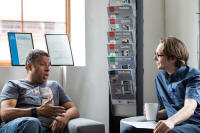Unit 1: Be(com)ing a teacher trainer

Welcome to the most difficult, the most rewarding and the most responsible job in English Language Teaching.
- The most difficult because you have to know everything (or, at least, a lot more than everyone else in the group put together)
- The most rewarding because you can positively affect the professional and personal lives of your trainees and colleagues. You can also have the opposite effect.
- The most responsible because you are at the top of the pyramid and every teacher you train will employ the skills you provide in every class they teach. That's quite possibly many thousands of learners and you are partially at least responsible for the kind of teaching they get.
Still with us?
OK.
 |
The difference between teaching a language and training a language teacherThe skills you have and the ones you need to acquire |
What's the difference between a waiter, a chef and a restaurant
manager?
Click on:
![]() when you have an answer.
when you have an answer.
The first is responsible for making sure that the customers gets
what they ordered in a timely way with courteous and efficient
service. The waiter is also in face-to-face contact with the
customers and represents the establishment. Rude, discourteous
and inefficient service will mean that people don't come back,
however good the food is.
The chef, on the other hand, may never get to meet a customer, has
no need to be courteous but is responsible for the food the
customers get. If it's cold, bland or distasteful, they won't
come back.
The manager's job is to train the waiters and negotiate the menu
with the chef. She, too, may never actually meet a customer
but complaints land on the manager's desk.
We shan't stretch the analogy too far because it will break but
the relationship between teacher, academic manager and teacher
trainer is not wholly dissimilar. The most important
difference is that the teacher trainer is not in charge of anything
so has power without responsibility.
If people leave your training as better teachers, no learner will
thank you. If they are ignorant, inefficient and disorganised
teachers, no learner will blame you.
 |
Responsibilities |
The first stop is to figure out just what responsibilities teacher trainers have on their shoulders and what skills they need to fulfil them. To do that ...
 |
Task: Here's a table of responsibilities. The task is to fill the gaps in your head. Click on the table when you have done that. |

You can see from that little exercise that you do not have to
learn a wholly new skills set but you do have to learn to do
some things that language teachers rarely or never do.
We won't dwell on some of the rows in the table because they are
obvious or no longer relevant to your role.
In particular, however:
- Provide models

Language teachers do this all the time, sometimes explicitly, usually just as a matter of course when using the target language.
Trainers, too, sometimes have to provide models, not of language but of techniques and procedures. This is especially true of courses for inexperienced teachers or those on initial training courses. Later on, it is unlikely that you will be thanked for explicitly modelling something most trainees can already do quite well.
Much is said about so-called loop input for teacher trainers which according to Woodward (2003: 301) isa specific type of experiential teacher training process that involves an alignment of the process and content of learning.
The assumption, not without its critics, is that matching the content to the process results in better learning. Here's an example from Woodward's article:
(Woodward, 2003:301)A course module on, say, the Presentation, Practice, Production, or 'Three Ps' method of introducing new language to foreign language students could, if run along loop input lines, have three main phases. The first is where the methods and materials associated with the Three Ps are elicited or taught to participants via texts or talks. The second is where the participants have a chance to try out the methods and materials in very controlled settings, such as micro- and peer-teaching practice. The third would be where they are encouraged to transfer them to situations which would be of use to them in their own classrooms. Towards the end of the module, if participants had not noticed already, the congruity between the content and the process of the module would need to be pointed out by discussion.
The part at the end about discussion is an important one. Woodward calls this decompression time and avers that it allows for a detailed and very useful consideration of what has been encountered.
(op. cit.:304)
(We shall gloss over the fact that PPP is not a method, although it derives from a methodology.) - Lecture

Language teachers are often criticised if they lecture rather than lead and it is true that just telling learners about the language or skill rather than getting them to use it is rarely effective.
However, you are not now, or will no longer be, a teacher. You are a trainer and you will be expected to be able to deliver engaging, concise, orderly lectures as part of your job.
This does not, of course, mean the freedom to drone on endlessly reading out your notes but it does mean presenting data in a way that people can understand, take notes on and be able to assimilate into their internal databank.
Data can also be absorbed via discussion, reading, tasks, workshops and in many other ways.
There is a mini-course in becoming a good lecturer in Unit 4 of this course. - Discuss methodology

Teachers rarely if ever indulge in discussions of methodology with their learners. Trainers, on the other hand, may do so very frequently.
Methodologies are ways of getting from here to where you want to be and the word discuss in this section is deliberately chosen.
Nobody, not even you, knows the right methodology and nobody can be entirely confident that there is only one best way of getting to the targets of teaching.
Leave your prejudices at the door of the training room and be prepared to discuss the approaches. - Establish rapport

Language teachers establish rapport in a number of ways: by being genuinely interested in their learners' lives, by treating people with respect, by being even handed in the classroom and more.
You can do all of those things, of course, or you wouldn't be considering the move into training.
There is, however, one more area in which you will have to work to establish rapport: trust in you as an expert.
Learners generally take for granted that a teacher of a language is an expert in it (however misguided the view sometimes is). Trainee teachers, however, are not usually so trusting even on initial training courses, let alone at in-service level. You will have to demonstrate continually that you know what you are talking about and that means doing good research and mastering the data and materials you intend to use.
There is no substitute for this and there are no short cuts. - Assess

Informally, teachers are assessing their learners' abilities continuously by listening to their output, watching them at work and talking to them. Formally, too, teachers often write progress and summative tests to see where the learners are and what needs to be recycled or revised. Learners are often reassured by that and sometimes motivated to study.
Yours is now a more formal and much more threatening role. It is so important that an entire unit of this course is devoted to how to do it. No more will be said here. - Plan

Of course you know how to plan.
However, planning for a teacher-training session is not the same as the planning for teaching that you have done up to now.
Instead of settling on a structure such as PPP or TTT and going from there to set up a series of activities and tasks leading to the mastery of the language or skill, you are now faced with editing and organising data.
This, again, is such an important area of teacher training that it forms part of a unit to itself. No more will be said here. - Give and get feedback

Learners expect, and usually get, instant brief feedback on their performance. During training sessions, that still applies because you need to be alert to what people are saying and measure from it whether they have absorbed the data or not. Careful handling of the feedback routines in training sessions is no less important than it is in language teaching but the targets are different. On a training course, feedback concerns the amount and quality of data that people have mastered but in language teaching the feedback is not on mastery of data, it is on performance.
Feedback on teaching is a different matter because here we are dealing with performance. How to give feedback also takes up a large section of another unit of this course so we'll say little more about it here, except ...
... feedback on teaching is usually:- delayed, because it needs to be properly thought through and the teacher also needs to carry out some kind of self evaluation
- lengthy, because there's a lot to discuss
- spoken and written, because people need the opportunity to discuss and justify as well as having something to take away and digest at leisure
- Observe

All teachers observe, of course, but they do so looking for the need to intervene or to find out what's going on when learners are working and really good teachers have the ability to observe themselves.
Your observation of other people teaching is of a very different order. You cannot, must not, interfere even if the process is breaking down irretrievably. You are not a knower, on hand for the learners or the trainee to turn to for help.
So different is the task you have now to perform that it is treated in a separate unit. No more will be said here. - Set and manage tasks

At last we come to something that is virtually unchanged. The skills you have developed as a task setter and manager are exactly the same ones you need to deploy as a trainer. The content, of course, is very different because you are helping people to acquire knowledge, techniques, ideas and ways of doing things rather than language or skills but the principles of task setting and management are unchanged. - Explain intricate grammar rules and discus
skills

All good teachers are adept at explaining a grammar rule in a way that the learners can understand and apply it and all good teachers have broken down skills into manageable components for practice and development.
Even teachers with a rather superficial understanding of the rules of English and the ways that skills are used can generally stay at least one step ahead of the learners in their care.
You now fall into a different category because you need to be able to explain grammar and skills far more thoroughly and accurately. It is no longer enough to be a bit better at this than the learners; you have to be a lot better.
This means reading, researching and properly understanding whatever the topic of your session on a course may be.
It will take time and effort. - Present research data

This is something language teachers almost never have to do unless they are working in quite specialised fields. On initial or pre-service training courses, the skill is also rarely needed. However, as we go up the levels in teacher knowledge and competence, the results of research in the literature need to be presented. That means two things have to happen which require time and thought:- You have to read the material
- You have to edit it and present it digestibly
- Read widely

There is an old compliant that academics don't teach and teachers don't read. There may be some truth in that but as a trainer you have a foot in both camps so reading widely around what you are presenting is essential. Start now. - Advise on research

Language learners may well operate independently at times and, no doubt, you have developed skills in advising and directing them when doing so. These are skills that need developing and enhancing because almost all formal training courses require some independent research and reading and most in-service formal courses leading to qualifications require very extensive independent work.
Your role here is not to do the work for them of course but to point them in the direction of good research topics and resources.
For that to succeed, of course, you have to know stuff.
At the end of this unit, there will be some self-evaluation tasks for you to identify where you are now and what you have to think and learn about concerning the skills you need to develop and those you need to acquire.
 |
Teacher training or teacher education? |
The term training has had a bad press recently because it
implies to some a rather mechanical process of getting people to
jump through hoops and copy other people's behaviour to reach the
goals.
The term education, on the other hand, has nothing but positive
connotations implying thoughtful processes of leading people to
developing knowledge and skills in a more certain, considered and
flexible way.
The dichotomy really isn't fair because training can involve thought
and a good deal of what passes for education involves mechanical
rote learning of facts (and some myths).
We see in
Unit 3 of this course that training or education of
teachers at different stages in their careers and for different
purposes has to take quite radically different forms.
On initial, pre-service courses a good deal of training is done via
a process of demonstration, imitation and then live practice with
real learners. That cannot work well on in-service courses
because the backgrounds of the trainees are so different and it
would be patronising and unwelcome to ask such teachers to copy
their trainers. In many in-house development programmes the
case is altered again because such programmes are not designed to
transmit data and train in procedures but to get already trained
teachers to introspect and set their own aims for mastery.
If you want to call the first sort of
demonstration → imitation → practice training and reserve the
term education for the other two types of, erm, training, then
that's a legitimate stand to take because they are very different
processes.
Nevertheless, for simplicity's sake, in this course we will call all
the processes training and refer to you as the trainer and to the
participants apart from you as the trainees.
 |
The role of a teacher trainer / educator |
Whatever you choose to call yourself, it is worth taking time now
to think about the roles you will need to be able to perform and the
implications of each.
As a language teacher, you have taken on a variety of roles in the
classroom and in the initial plus section of this site there is a
guide to the roles of a language teacher.
These roles include but are not limited to:
| assessor contributor counsellor designer |
diagnostician disciplinarian facilitator knower |
language resource manager methodologist monitor |
narrator planner reflector relationship builder |
If you would like to remind yourself what these roles are in a little more detail, this link will take you to the relevant part of the guide. That will open in a new tab so just shut it to come back here when you are done.
You may think we can delete narrator from the list because this is quite a rare skill to use in training sessions. It can happen, however, and is mentioned in this course in Unit 4 to do with the design and delivery of training sessions where it is suggested that a narrative can play an engaging and refreshing role in a training session. It does not appear below because it is quite rare.
Because you are already a very experienced language teacher, you
have, no doubt, taken on all these roles quite frequently.
We have already seen in the unit that some of these roles are
required more or less frequently in the transition from teacher to
teacher trainer but there are others that we should add to the mix.
Some of these roles will involve rather different skills for
trainers so here's a task.
 |
Task: Download the worksheet for this task. Look through the list of teacher roles and ask yourself two questions: a) is this a role I will need to take on as a teacher trainer? b) what changes to the role have to made in the transition from teacher to teacher trainer? Click here for some comments when you have completed the worksheet. Take your time. |
- Assessor
- Language teachers assess language production and skills.
- Trainers assess teaching skills and knowledge of theory rather than language output.
- Contributor
- Language teachers may contribute an opinion or theory to a discussion as an equal participant.
- Teacher trainers will usually contribute input into tasks as a knower rather than simply as a participant or opinion giver.
- Counsellor
- Language teachers often advise and counsel learners on their progress, learning skills and next steps etc.
- Trainers will be more concerned with helping people to research and approach teaching.
- Designer
- Language teachers design tasks, worksheets and activities which focus on skills getting and using.
- Trainers will have more to do with inventing ways of presenting data and constructing tasks and activities which lead to the acquisition of knowledge and skills than on finding useful texts and engaging images.
- Diagnostician
- Language teachers are concerned to diagnose the source of learner error and poor skills performance.
- Trainers will be concerned with figuring out what it is about someone's classroom behaviour that means that things are not going as well as they might.
- Disciplinarian
- Language teachers sometimes keep order, especially with younger learners, by telling people off for breaking a class contract.
- Trainers may have more to do with keeping trainees to deadlines.
- Facilitator
- In both teaching and teacher training this is a key role in which you are well practised so nudging activities along and providing a little help and guidance for workshop tasks will not be unfamiliar territory.
- Knower
- Is what you still are but, as we mentioned above, you need to know a good deal more than suffices for teaching language even to advanced learners.
- Language resource
- Language teachers in this role generally supply language items that learners need to complete tasks.
- This will still be a role you need to have but you will not be supplying language, you will be supplying knowledge about language.
- Manager
- is a role you are used to. Setting time limits, giving clear instructions for tasks, setting up groups and re-grouping people are all skills you have practised time and again. You have nothing to fear.
- Methodologist
- Language teachers operate in this role when they are making a principled selection of course materials and activities.
- For trainers, this role is now to do with being able to present the data about methodology in a digestible form given the backgrounds and experience of the trainees.
- Monitor
- This is unchanged. It is something you have done repeatedly and know how to do non-intrusively but alertly.
- Planner
- This is also something you can already do well and know how to structure lessons and order tasks logically.
- However, in training this frequently involves the key skill of planning what to leave out bearing in mind the needs of the learners and the demands of the course.
- Reflector
- This is something you still need to be. At the beginning of your training career you need to carry over the reflection skills that made you a good teacher to self-evaluate how you can become a great trainer.
- Relationship builder
- Rapport between you and the trainees and between the trainees is an important part of creating and maintaining a positive learning atmosphere. You already know that and have techniques and behaviours to make sure they are maintained.
It is unlikely that there will be an exact match between this
list and your ideas. That's fine as long as there is
some overlap!
At the end of this unit, there will be some self-evaluation tasks
for you to identify where you are now and what you have to think and
learn about concerning both the skills you need to develop or
acquire and the roles you'll need to take on.
 |
Knowledge you need |
If you cast your mind back to when you were a novice language
teacher, it will be surprising if you don't recognise that you were
often only one step ahead of the learners when it came to analysing
the language.
You were probably quite capable of explaining that, for example:
We use
any in questions and negative
sentences and some in
positive statements
because you had read the relevant bit of a grammar for learners.
It is possible that you'd be quite thrown when someone pointed out
that we say:
Did some people from the council come round?
Didn't someone ask?
If we have any, it's in that cupboard
She refused any help
Would you like some more time?
all of which appear to break the rules, of course.
Now, at this stage in your career, naturally, you have a more
sophisticated view of assertive and non-assertive forms so can
explain quite easily. That knowledge came at a cost in time
and energy, not to mention motivation to learn.
On an initial or pre-service training course, you may feel you know
enough to proceed with some confidence but above that level, you
probably need to do some serious reading and study.
Now you are a novice teacher trainer and the process starts
again.
That's OK – you have done it before.
Just as you learned back then, you have to have the confidence
occasionally to say:
I'm sorry, I don't
know the answer to that but I'll find out and get back to you.
Naturally, enough, that won't wash as a response on more than one or
two occasions so you will need to build on your knowledge, not just
of language forms as in this example, but of methodology,
psycholinguistics and learning theory, sociolinguistics and a range
of other issues including semantics, pragmatics and morphology.
This site is a good place to start so you should take some time
while you are doing this course and after it to investigate corners
of the language that you don't recognise too well.
Here are some places to begin your journey to better mastery of your
field. All links open in new tabs.
| The in-service training index | Here you will discover links to guides to language analysis, skills, methodology, assessing and much more. |
| The A-Z index | This is a long list for you to browse until something catches your eye. It's also a good place to start when researching a for a training session. |
| The glossary index | This will take you to an index of glossaries and definitions. Many of the entries are explicitly linked to guides on this site. |
| Grammar references | Short bibliographies of what you should have or have access to (and read, of course). |
| Skills references |
 |
Knowing it all |
It is said, with good reason, that the great minds of the
renaissance (Galileo, Newton, da Vinci etc.) knew everything there
was to know. You and I are not in that league. Nobody
knows everything any longer and nobody knows the whole truth about
anything important so it's as well to maintain a modest attitude.
When it comes to teacher training, the situation is rather like
this:

and nobody, no matter how certain and sure, knows what's in the
outer circle.
 |
Beliefs, attitudes and prejudices |
Language teachers all have underlying beliefs which inform the
way they select targets, plan, teach and assess competence.
Some teachers may be able to articulate their beliefs persuasively,
others may not even know they hold them.
Here are a few for which it is difficult to find any solid,
uncontroversial supporting
evidence in the research literature but which are, nevertheless
widespread in the profession.
Make your own responses to the assertions and then click on the
![]() to reveal some comments.
to reveal some comments.
| Using a translating dictionary is
something we should actively discourage. |
Nobody seems to
know where this one comes from. The antagonism to
translation in language teaching, however, goes back
many years but has recently been challenged. If
you were learning a new language, would you buy a
translating dictionary?
|
| New language should be heard and
spoken by learners before they are asked to read and write
it. |
This, too, has
a long history but there's no evidence that it's true.
It depends what sort of language used for what purposes.
|
| Explaining grammar rules is usually
unhelpful. |
This belief originates in the early days of
Communicative Language Teaching but has since become an
excuse for many teachers not to learn about their subject
matter.
Lots of learners want to be told rules and many benefit from them. Some don't, of course. |
| Drilling new language is essential
if it is to be mastered. |
There is almost no evidence that drilling of any kind
enhances either performance or knowledge. Many
teachers do it and many learners expect it but it is
doubtful if it does any good at all.
|
| Teacher talking time should always
be kept to a minimum. |
This has become something of a mantra on teacher
training courses and it's true that when the teacher is
talking, the learners are not. They may, however,
be learning.
Teacher talk is a resource like any other. Poorly used it is unhelpful but high quality, appropriate and comprehensible teacher talk is valued by learners. |
| It is always better to try to
elicit language before supplying it. |
This is another mantra and needs to be viewed with some
common sense. If learners do not know a bit of
language, no amount of elicitation is going to change
what's in their heads.
|
| The focus in classrooms should be
maintained on language in context for communicative
purposes. |
Communicative Language Teaching has become such a
dominant go-to methodology that people have become
reluctant to question it. Nevertheless CLT has
been criticised in a number of ways.
For a list, go to that part of the guide to CLT (new tab). |
And so on.
This list could, of course, be greatly extended and most guides to
theories of language and theories of learning on this site have
sections devoted to criticisms and objections.
Unit 2 of this course mentions this again and provides a link to a
guide on this site which sets out a range of myths about the
language and teaching procedures.
It may be worth a few minutes of your time then or now. Click
here to open the guide in a new tab.
The moral of the story is to maintain some healthy scepticism and
encourage it in your trainees. Faith alone is not enough.
It is not within any teacher trainer's job description to say with
absolute certainty what constitutes best practice, what language is
and how people learn languages. Some may arrogate this
air of omniscience to themselves but you should avoid it.
There are some persuasive theories about language and learning but
many conflict with other equally persuasive theories and some are a
good deal less persuasive than others. We cannot discover how
best to teach a language by starting from a philosophical prejudice.
There are, of course, many more ways of teaching badly than there
are of teaching well but teaching well, too, can be done in many
ways.
 |
Trickle-down training |
In many institutions, trainers are drawn from people who have
themselves been through the institution's training programme and
then gained some greater experience. Now, you may believe that
the training you received was exemplary and that you should, as far
as possible, try to duplicate what you encountered as a trainee when
you set out to train because, after all, it resulted in your current
level of great competence and profession skill.
There are dangers to this sort of process:
- Misconceptions, myths and groundless assumptions about language and learning tend to proliferate and are passed on to generations of trainers.
- In the copying process, errors occur which cannot be satisfactorily fixed. For example, once a misunderstanding of the distinctions (or not) between style and register is embedded in a trainee, when that trainee becomes a trainer, the misunderstanding gets passed on to a new generation who may, in turn, become trainers. And so it goes on.
- Progress is glacial or imperceptible because the institution has decided on what it believes best practice to be and no changes are made.
The moral here is to keep an open mind and do your own research concerning the data you are trying to present. Do not use the notes you took on your training course as a guideline for constructing your own training behaviour.
 |
Paddle your own canoe |
It is likely, however, that as a new trainer you will be taking
the lead from others in the institution (although, for example, with
short intensive courses and in-house development / training programs
that is not invariably the case).
The comments above are not at all meant to imply that you shouldn't
take your colleagues' views seriously, just that you should, from
time to time, be prepared to paddle your own canoe with regard to
what you say in training sessions and how you understand ideas,
hypotheses and concepts.
Many established training teams welcome the injection of new
thoughts and the corrective nature of another view. On the
other hand, there are trainers who have developed over the years a
set of prejudices and assumptions which are not based on authority
or research but on personal opinion and, alas, sometimes
misunderstood reading. You need to handle this kind of
situation with some care but, if what you say is firmly based on
your own research and reading, you should not be afraid to argue
your corner.
Nobody is omniscient.
 |
Self-evaluation worksheet |
This is not a taught course so you are going to have to evaluate
your own skills and shortcomings. Naturally enough, even on a
taught course, you will often be required to do that.
Introspection and reflection are key teaching skills whatever you
are teaching.
You need to look in a mental mirror and assess as honestly as you
can where are, where you need to be and how to get there.
There is one worksheet here with two tasks.
Click here to download the worksheet.
What you write in the right-hand column for those two tasks is
not predictable but it is to be hoped that occasionally you may
write something like:
Do the rest of the units in
this course.
Reference:
Woodward, T, 2003, Key Concepts in ELT: Loop Input, English Language Teaching
Journal, 57/3, July 2003, pp301-304, Oxford: Oxford University Press
